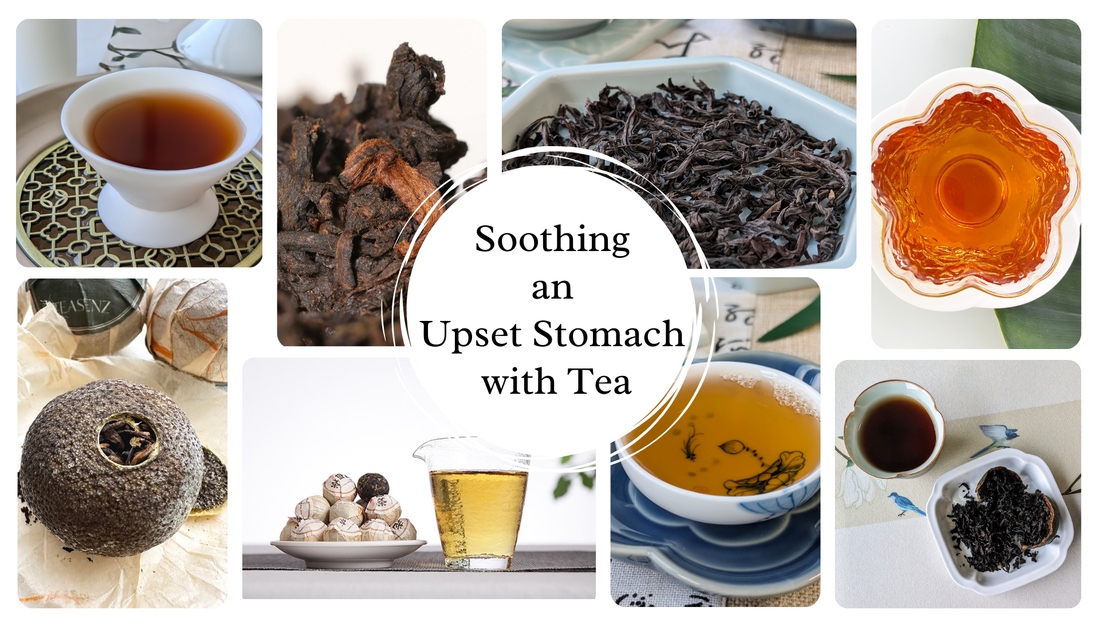Best Tea for Upset Stomach: Does Tea Soothe an Upset Stomach?

Share
Do you feel unwell after a heavy meal? Does your upset stomach need relief? Contrary to some common beliefs, tea can be an effective option for soothing your stomach. However, not all teas are equal. In this blog post, we'll offer some handy tips and reveal the best types of teas that may aid your digestion.

To be avoided: green tea, light oolong & fresh white tea
First, here are some recommendations for teas that you should avoid when dealing with an upset stomach. Fresh white tea, young raw pu erh tea, green tea, and lightly oxidized oolong tea are considered very 'raw' teas, which can be harsh on the stomach. These are definitely teas to avoid when suffering an upset stomach.
It's important to note that these teas often contain a significant amount of caffeine due to the high ratio of tender leaves and buds. This can exacerbate the stress on an already weakened stomach.
Recommended: dark, black, aged and roasted teas
Now, let's see which teas can soothe your stomach. Roasted oolong, aged, dark and black teas are all great options for this purpose, as they have a warming effect on the body.
Ripe pu erh and fermented tea

Fermented/dark tea and ripe pu erh are the best for soothing the stomach. Their complex and bold aroma includes wood, earthy, fruity, chocolate, sweet, and nutty flavours. Their dark, rich, and thick body is smooth and pleasant. Because their caffeine content is lower than other teas, they're a good choice for those who can’t stand too much caffeine or have stomach issues. The more aged, the better! For interesting and delicious ripe pu erh, we suggest the Chaze Jin Cha Shou Bing, the best-selling Dayi 7572 Ripe Pu Erh Tea Cake or the single serving Lao Ban Zhang Ripe Pu Erh Tea Balls. If you’re curious, try out the Jing Fu Yuan brick tea, which has a fruity and grain-like taste due to the edible ‘golden flower’.
Xiao Qing Gan

A special type of ripe pu erh tea that is excellent as an after-meal drink is Xiao Qing Gan, also known as Chenpi ripe pu erh. This tea consists of small green tangerines from Xinhui in the Guangdong region, which are stuffed with ripe pu erh tea. The combination of the citrus aroma from the dried tangerine peel and the earthiness of the ripe pu erh creates a warm and balanced flavour profile. It's hard to dislike this tea, as it is sweet, warming, citrusy, and mellow—appealing to a wide range of palates. In Traditional Chinese Medicine, these tangerines are used to alleviate sore throats and digestive issues, making them a popular choice for post-meal drinks. For a stronger aroma, you can try our Teasenz Xiao Qing Gan, while our Premium Xiao Qing Gan Tea offers a more refined experience. These tangerines can be steeped for a long time; one small tangerine can infuse flavour in nearly two litres of water.
Aged white tea

An old saying states, "1-year-old white tea is tea, 3-year-old white tea is medicine, and 7-year-old white tea is treasure." This saying reflects the belief in the health benefits of aged white tea, especially in Traditional Chinese medicine, which often recommends it for treating colds. Similar to aged pu-erh tea, aged white tea can help relieve stomach discomfort after a heavy meal. Its medicinal properties and smooth, sweet flavor soothe the body. You can enjoy aged white tea either infused or simmered, but make sure you drink aged white tea rather than fresh tea. Fresh white tea contains a lot of caffeine, which can irritate the stomach, so it is best avoided. If you're looking to try aged white tea, consider the Bai Mu Dan 'Xiao Bai Tian' tea cake, which has a comforting woody and cinnamon flavor. You might also enjoy the Moonlight white tea balls, which are rich in ripe fruit, spices, and herbal notes, or the fruity aged Shou Mei tea balls.
Black Tea and Dark Oolong

Black tea and high-oxidised oolong could also be a good choice for contrasting the effects of abundant meals on your stomach. The warming effects of these teas on the body can quickly calm a distressed digestion. Although more studies are needed, some research shows that black tea can also improve bowel movement. Keemun and Yingde black are right for you if you’re carving for robust but creamy and sweet tea, while if you want less creamy but highly aromatic and crisp tea, you should try some roasted oolong like Da Hong Pao or Mi Lan Xiang.
Caffeine free infuses
If you can't stand caffeine or prefer something other than regular tea, some herbal tea would be fine. Fennel and liquorice are perfect for upset stomachs, as they are naturally anti-bloating and aid digestion. Liquorice, in particular, has anti-heartburn properties. However, be aware that liquorice isn’t good if you have high blood pressure. Chrysanthemum, peppermint, and camomile are pleasant alternatives if you prefer other flavours.
That said, these are just suggestions and guidelines, as each body reacts differently. You should always listen to your body and act accordingly. Even if tea is considered healthy and safe, too much of a good thing is bad!
